IN A STRANGE TOWN.
Chapter 9. Feb 7 2022. Text by SC. # Comments
When we first started planning our year of travel, Kevin unfurled a non-stop itinerary that involved visits to many destinations in several countries over a number of continents. My response was "Wait a second! How about we spend six months travelling around and six months in one place?"
While Kevin and I have both travelled quite a bit before we met, we did so in very different ways. Kevin has been to more countries than anyone I know, some I’d never even heard of. He also likes to create complex itineraries based on factors that go beyond geography. On one of our first trips together, we went to Poland and Cyprus, which are nowhere near each other. But there was a great deal on a business-class flight returning from Poland and we’d already decided to go to Cyprus - so why not combine the two?! I, on the other hand, have lived in more countries, and once there, I’ve taken advantage to visit the region, as well as really getting to know the place. I love feeling like I have "tamed" a city: streets become familiar; I stride with confidence through aspects I initially found daunting; I have my places and familiar faces.
So we agreed to spend more time in one place and Dakar seemed like a good choice. We both had yet to visit any part of West Africa, so it made sense to spend time in one of its major cities. It’s a francophone country, and I was itching to be in a French environment for a while. Plus it just seemed like a cool city. Six months somehow got whittled down to two…but nonetheless a plan took shape: we found an AirBnB, Kevin made arrangements with the University of Dakar to teach a course there, we set some dates, and we were ready to spend time on the westernmost point of continental Africa.
CITY BY THE OCEAN
Dakar is a big African city with much of what that encompasses: the city is dense and spralling, the infrastructure is uneven, the traffic can be bad, and the air quality is not great. But all of this fades into a faint din in Dakar as one admires the ocean, which is never far away. While the city is framed on several sides by the ocean, the actual land that’s along the water remains largely undeveloped. Everyone has easy access to the sparkling water and the crashing waves. In the evening, around 5 pm, when the day’s heat starts to diminish, the beaches become alive with people, mostly young men who come to work out. There are people jogging on the beach, playing soccer next to the crashing waves, and completing training drills for la lutte, a popular Senegalese form of wrestling. Young boys in their underwear or shorts ride the waves in large groups, some of them holding on to large water bottles as buoys should the waves take them further out.
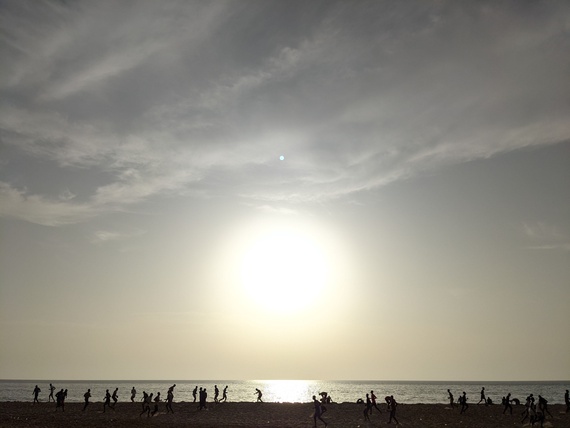
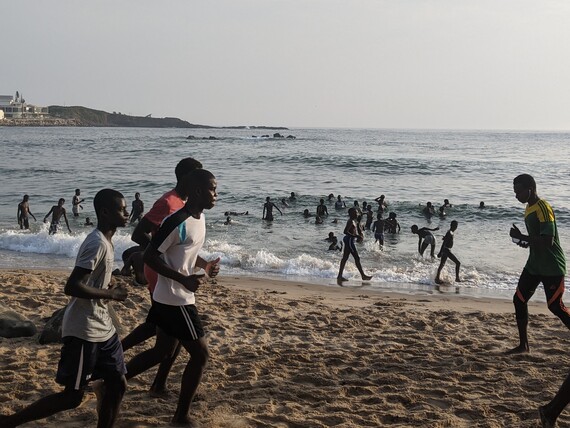
A city really can’t get too wound up when the beach is never far away, not to mention palm trees and the sun. Our first week, we went to Chez Max, a very laid-back beach bar tucked into a little nook of a beach between some rocky cliffs. Chez Max was decked out in hammocks, recycled art, and good vibes; the kind of place where a lot of pot would be smoked if only it were legal. Instead they serve tasty freshly made juices to those coming in from a dip in the ocean. I reflected on everything I had done right in life to be spending a Thursday afternoon sipping a fresh pineapple juice in a hammock and fell asleep.
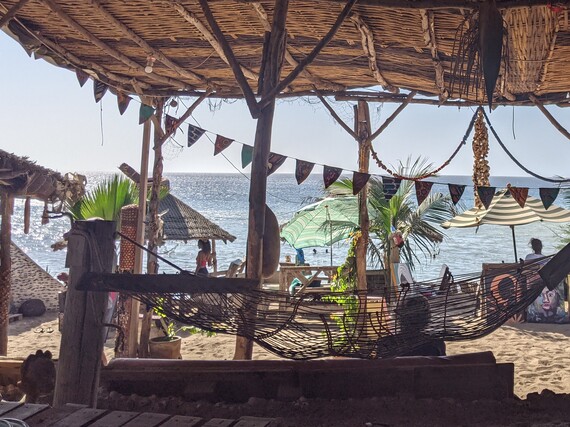
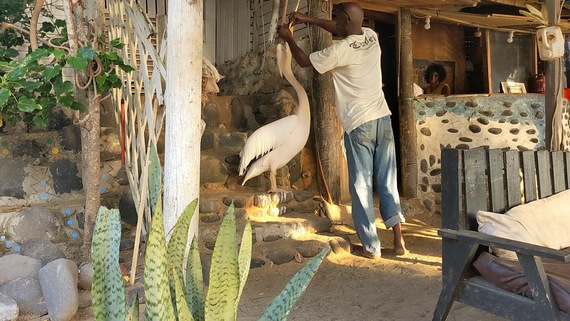
When I woke up, a four-foot-tall pelican was standing near me. I wondered if I was still dreaming. A guy got up, went through a door and came back with two whole fish. He went up to the pelican, opened his beak, put a fish in, and with both hands forced the fish down the bird’s long neck. "Does he have trouble eating?”"I asked. "No. He only likes dorado, and I don’t have any right now." I later learned that this was Chez Max’s pet pelican, a rascally guy who liked to get in tiffs with the bar’s dog, regularly tried to eat menus, and could play a surprisingly good game of catch with his beak.
COST OF LIVING
One of the most surprising aspects of Dakar is the cost of living. Considering that Senegal is ranked 168th out 189 on the Human Development Index (which includes life expectancy at birth, years of schooling, and national income), one would expect life to be very cheap coming from a rich country like Canada. Or if you’ve travelled to Latin America or Southeast Asia, where backpackers rejoice at the $15-20/night hotel rooms and $3-5 meals, you might expect Senegal to be similar. It is not. What we paid for the apartment we rented through AirBnB was the same as what we pay in rent in downtown Toronto. Electricity, which we had to pay on top of our rent, was way more expensive than in Ontario. Groceries were as, if not more, expensive than at home, and restaurants were roughly the same price.

A few services were cheaper. Bright yellow taxis, which constantly drove around looking for passengers, were less expensive than our Ubers. And that was even if we probably paid a slightly inflated price, since there weren’t meters and we were clearly not Senegalese. Public transit, in buses or crowded passenger vans, cost peanuts to cross the city.
The real mystery was how regular Senegalese people managed to afford things. What certainly was much cheaper was the cost of labour, which means that most salaries are meager. For example, our apartment came with a cleaning lady, who was hired to work six days a week. We were told by the owner that on top of the cleaning, she could take care of the laundry, ironing, and cook up to one meal a day. He added, though, that we could determine with her how often she actually came. Of course, it seemed beyond decadent, and frankly embarrassing, to have someone else do our laundry or cook for us when neither of us was really working. So we settled on her only coming three days a week. As for the owner, whatever he was paying her was so insignificant that he was unconcerned whether she came three days or six; he paid her the same either way.
THE FRENCH PRESENCE
A factor that was equally surprising, while also partially helping to explain the cost of living, is the omnipresence of France in Dakar. Though Senegal has been officially independent since 1960, the ties to the former colonial power can be seen from the country’s currency, its security, its businesses, its cultural class, and the number of French expats living in the country.There is a giant military compound, occupied by French forces, smack in the middle of the city, on what must be very valuable property (Dakar is definitely growing and experiencing a property boom). On the plus side, this presence has ensured that Senegal has consistently remained an incredibly safe and stable country; not something to take for granted when you consider the rapidly deteriorating safety in regional neighbours like Mali, Burkina Faso, and Niger. But it’s nonetheless weird to see French military planes overhead or armed French soldiers in front of the base in an African country in the 21st century.
All the major supermarkets in Dakar are French (Casino, Carrefour, Auchan), primarily stocked with French goods. Despite Senegal having no shortage of cows - the Fulani, a traditionally pastoral group, compose a quarter of the Senegalese population - the vast majority of the dairy products in the supermarkets, including shelf-stabilized milk, are imported from France. Many of the banks and gas stations are also French. Given my time in East Africa, where the vast majority of these types of businesses are national, if not then regional, it was very surprising to note these persistent colonial ties. It hasn’t gone unnoticed by the Senegalese, who in March of 2020 took to the streets to protest the French presence, attacking the most visible businesses. Indeed, it was noticeable how peoples’ demeanor toward me melted the instant they learned I was Canadian and not French. It will be interesting to see whether this opposition movement continues to grow. Given how busy the supermarket aisles were, there’s no indication that the French are leaving any time soon.
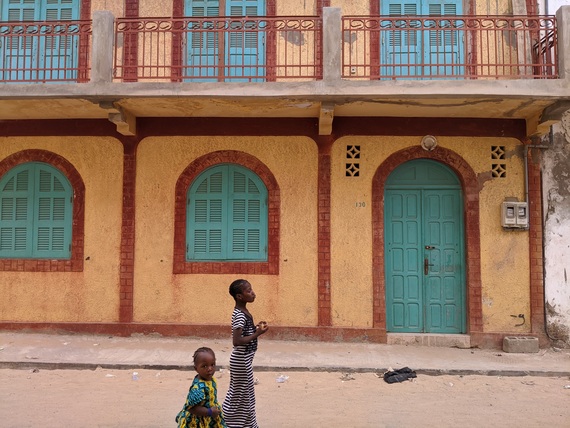
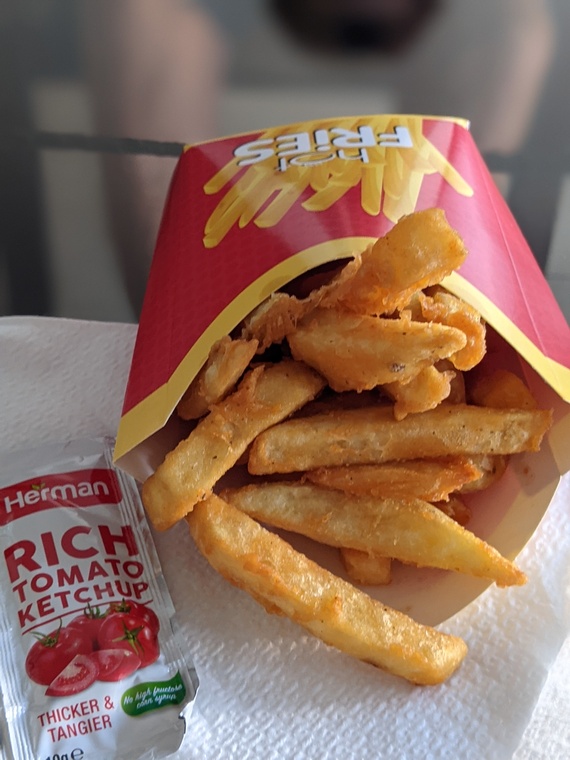

We were quick to turn to the small fruit and vegetable stalls, tiny corner stores that sold a range of essential goods, and neighbourhood bakeries for the vast majority of our purchases so that our money would go into Senegalese pockets. We were also easily won over by the fries at Djolof Chicken, the most prominent fast food chain in the country, owned by a successful Senegalese businessmen who also owns a series of gas stations and convenience stores. Kevin, whose mini-course at the university was on high growth entrepreneurship, encouraged his Masters students to think about how they could create and grow businesses that would further contribute to their country’s development.
A DYNAMIC CULTURAL SCENE
Many would agree that West Africa has one of the most exciting cultural scenes in the world right now and certainly Dakar is one of its hubs. The prominent American artist Kehinde Wiley, launched into the stratosphere of international art superstars when he was chosen to paint the official portrait of Barack Obama, started a prestigious artist residence in Dakar a few years ago. The Institut Français has a jam packed schedule of exhibits, movies, performances, and talks featuring Senegalese or West African talent. Senegalese writer Mohamed Mbougar Sarr won the 2021 Prix Goncourt, France's most prestigious literary prize, a first for a sub-Saharan African. Local galleries are sprouting up to provide emerging artists with opportunities to build their careers and reputations.One such gallery featured a young Malian artist, Alassane Koné, who is perfecting a technique that puts cotton thread at the heart of his artistic expression. He stitches brightly coloured young men seeking to explore and connect with the world. Admiring his work, it certainly felt as if we were discovering a new talent that is ready to see his career takeoff. He seemed beyond thrilled that he’d sold a third of his pieces on the opening night.
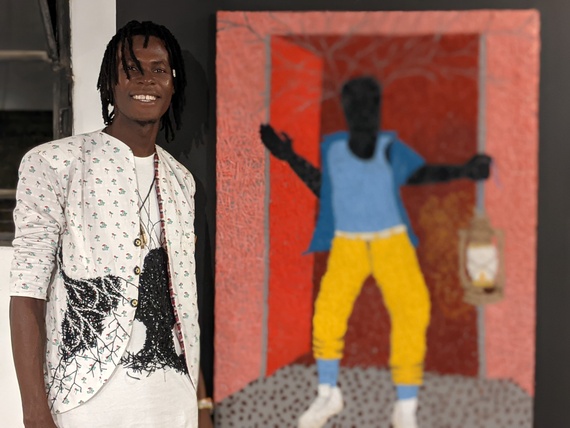
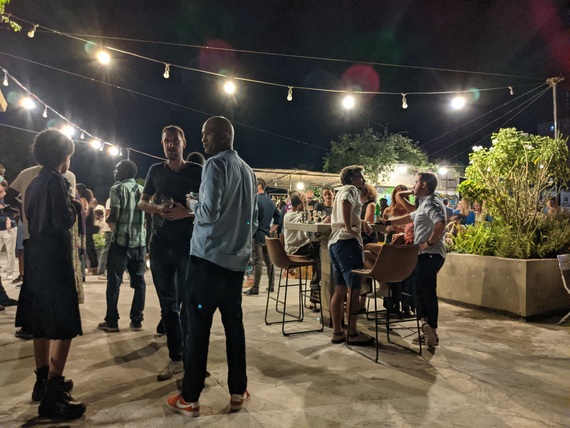
Next door, a crumbling open air concrete building housed a photo exhibit by a Swiss-Senegalese artist on migrants travelling from West Africa to Europe. Stylishly-dressed art enthusiasts sipped wine, beer, and hibiscus juice while admiring the blown-up pictures that sometimes took up an entire wall. The artist must have been more Swiss than Senegalese, as none of the pictures were for sale.
The rooftop party that celebrated these shows was packed with locals and expats drinking Flag beers and cocktails, snacking on finger food from a range of local pop-up food stands, and artfully bopping along to the thrumming background music. Move over Brooklyn, Berlin, Krakow: Dakar is the new cool kid on the block.
FRIENDS IN THE RIGHT PLACE AND RIGHT TIME
Without question, the factor that made our time in Dakar most enjoyable was the very happy coincidence that one of Kevin’s friends from grad school, A., also happened to be in Dakar at the same time as us. Originally from a small town on the outskirts of Dakar, A. is now a professor in New York. He took a sabbatical from the university to return to his home country to work for the Ministry of Economics. His new wife I., originally from Nigeria but who also lived in New York, was able to join him thanks to remote working. Like us, she was just getting to know Senegal, and all three of us benefited from A. who served as a proud guide. Together we visited the aptly named “Lac Rose” just north of Dakar, the laidback mangroves and beaches to the south, as well as countless restaurants, neighbourhoods, sites, as well as cultural and social events throughout the capital. We also got to know A.’s family, being warmly welcomed and very interested to hear their perspectives. Sunday lunch and Thanksgiving dinner with the family certainly kept any feelings of homesickness at bay.
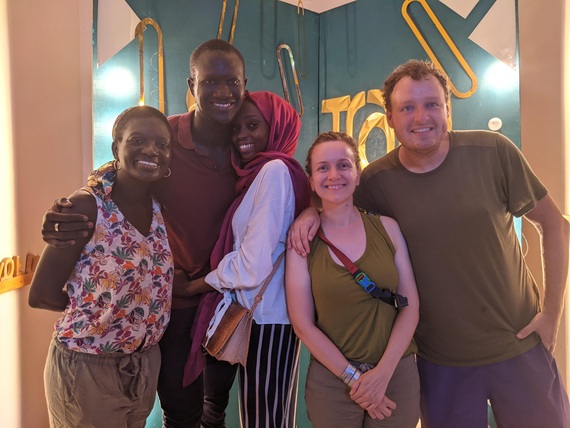

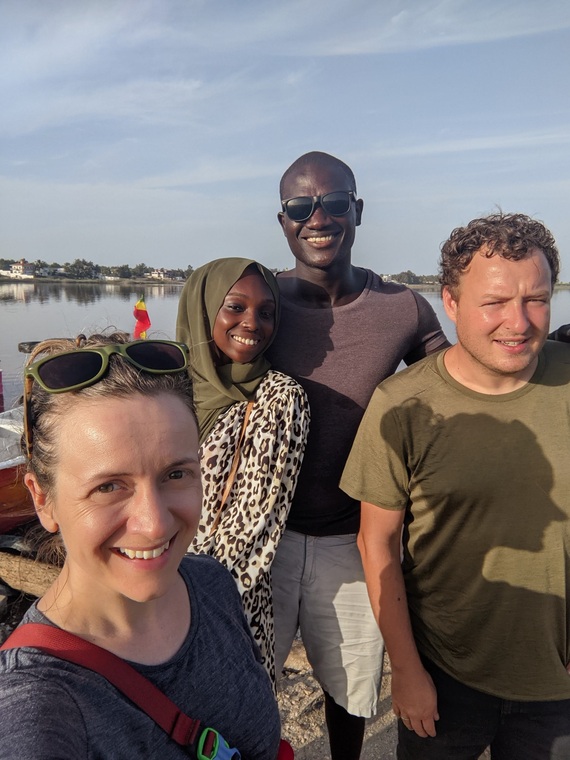
As our days in Dakar drew to a close, I already started to be nostalgic for our time there. I already miss the ocean views, the Dutch wax outfits, the street coconuts, the feeling of safety, the heat, the absence of corruption, and most of all the friendly people. It’s always the people we miss the most but it’s particularly true when the people are kind and welcoming; when every day interactions are warm and easy, even though you are a guest; and where many people, most of the time, go out of their way to be helpful. I can only try to be as welcoming to the many Senegalese who live in Canada when I get back home.
Text by SC
Dakar, Senegal
February 7 2021
Tweet
Practical Details - Senegal
Hotels
We stayed in AirBnBs in Dakar; Mermoz is the neighborhood that best combines proximity to downtown, local culture, safety, and not too many expats. Ngor and Almadies are better for access to the beach and Western restaurants. The Plateau is a bit desolate at night. Outside Dakar, the former French West African capital of Saint Louis has many old colonial bed and breakfasts (JAMM was quite good [$90]). In the southern Senegalese region of Casamance, Esperanto Lodge [$80] has nice bungalows in a quiet area of beachside Kafountine. Slightly further afield in Guinea Bissau, Ponta Anchaca [$260] on an idyllic beach in the Bijaos archipelago may be the top remote getaway in West Africa.
Food
In Dakar, we recommend many local juices (baobab ("bouye"), ditakh, ginger and bissap), the shrimp and gambas at Point des Almadies and Noflaye Beach, the paneer makhani at Annapurna Indian, the pizzas at Le Colorado especially with their lunch special, and the french fries at local chain Djolof Chicken. In Saint Louis, the seafood dishes at Chez Dasso and the coffee at Ngar Ngar are both great. In Casamance, we recommend the brochettes de lotte at Esperanto and the homestyle thieboudienne (a type of fish jambalaya that is Senegal's national dish) at the Kora Workshop in Kafountine. Throughout Senegal, the colonial influence means French bread and pastries are widely available and high-quality.
Transport
Between Dakar and Casamance, a flight on Air Senegal is inexpensive [$60], though Dakar's airport is very far from the city and expensive to reach [taxis from $45]. Buses and collective taxis connect major cities for roughly $1 per 50km, and are of reasonable quality. It is possible to buy out extra seats on collective taxis.